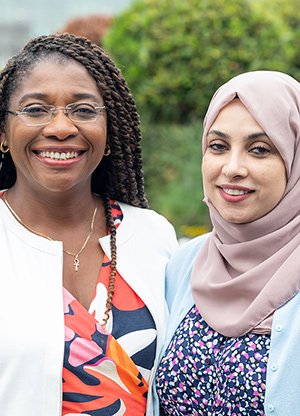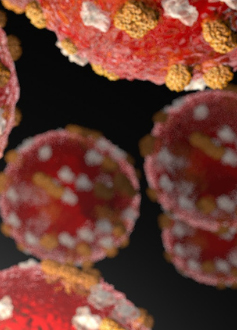

Patient participation: Javed Moore’s story
Professor Richard Neal is confident that Multi-Cancer Early Detection tests (MCEDs) are the future of primary care cancer diagnostics
A Professor of Primary Care, a working GP and a seasoned researcher of cancer diagnosis and screening, Richard is one of two Co-Chief Investigators of the NHS-Galleri trial, the world’s largest trial of a revolutionary new blood test that can detect a shared cancer signal across more than 50 types of cancer before symptoms appear.
The trial is investigating whether Galleri® can reduce the incidence of late-stage cancer when used in an asymptomatic population, in combination with existing NHS cancer screening programmes. The first of its kind, it has seen over 140,000 people aged 50-77 register to take part, across eight regions in England from a wide range of backgrounds and ethnic groups.
“If the trial has positive outcomes, I could see a future where people over a certain age would be invited for an annual blood test,” says Richard. “It has the potential to be a game changer.”

A Professor of Primary Care at the University of Exeter, Richard has 20 years’ experience of researching cancer diagnosis and screening, has published over 200 peer reviewed papers, and chairs the RCGP’s Scientific Foundation Board. He also works one day a week as a GP at St Leonard’s Practice in Exeter.
Richard brings his expertise as a GP - and his background in community and applied health research - to the trial, alongside his Co-Chief Investigator, Professor Charles Swanton, a world-leading oncologist.
“Put simply, we’re responsible for running and delivering the trial, and all that involves” he says.
“It’s hugely exciting to be closely involved in research that could give us a much clearer picture of how the Galleri test could be used to help the NHS detect cancer early.”
Galleri is a blood test that works by finding chemical changes in fragments of genetic code-cell-free DNA that leak from tumours into the bloodstream. Research has shown it’s particularly effective at finding cancers that are typically difficult to identify early – such as head and neck, bowel, lung, pancreatic, and throat cancers.
Participants in the trial have been asked to undergo three rounds of screening, a year apart, with the third round beginning in September of this year. Full reporting and results are expected in 2026, to decide whether to proceed to possible full roll-out as a national screening programme.
“The NHS Long Term Plan has a target of diagnosing 75 per cent of cancers at an early stage by 2028, and if the trial goes well, it could play a major part in achieving this,” says Richard.
The trial is being warmly received by the patient and healthcare community, with a high participant retention rate, and GPs stepping in to help recruit ethnic and hard-to-reach patients.
“The trial retention rate bodes well if it’s rolled out,” says Richard. “The requirement for participants is low, and they know that even if they’re not in the intervention arm of the trial – so there’s no potential direct benefit to them - they’re still contributing to important science.
“And for GPs, it’s easy to see the benefits to our patients. We’ve seen too often how late diagnosis destroys lives. This type of screening programme could mean more patients would receive an early diagnosis, better treatment and quality of life - and potentially be cured.”
Just how such a system would work is yet to be decided, but Richard envisages something along the same lines as current NHS cancer screening programmes.
“In existing screening programmes, the role of the GP is to provide good data to underpin call ups and provide resource for testing, with everything else happening through a central system. If this sort of system were adopted, GPs would be an important cog, but wouldn’t be overwhelmed.”
He admits that amid the positive response to the trial and the potential of MCED technologies, there are still some concerns, including overdiagnosis. “In some very early-stage cancers, treatment given is unpleasant but also unnecessary, because that cancer wouldn’t have harmed the patient during their lifetime, so this is a very valid concern. That’s why we’ve taken it seriously in the design of the trial and will be measuring it carefully,” he says.
“Because Galleri is DNA-based, it’s good at spotting cancers that shed a lot of DNA into the blood, which are usually the most aggressive cancers. Cancers that are typically overdiagnosed shed less DNA, so there’s less to detect, and the risk of overdiagnosis is relatively low. We think that overall, the benefit of the test likely outweighs this risk.”
In June, another UK clinical trial called SYMPLIFY using multi-cancer early detection technology reported “promising” results in individuals who presented with symptoms to primary care and were referred for diagnostic follow-up for suspicion of cancer. The analysis showed strong performance of GRAIL’s MCED test in the population of more than 6,000 patients and demonstrated the feasibility of using an MCED test to assist clinicians with decisions regarding referral from primary care.
“Galleri could help revolutionise how we diagnose cancers,” says Richard. “Whatever the outcome of the trial, I’ve no doubt that MCED tests are coming and will be part of our health system in the future.”
Developments in the NHS-Galleri trial can be followed on the NHS' trial updates page.
Read more

Thank you for your feedback. Your response will help improve this page.


